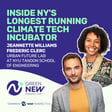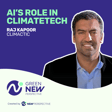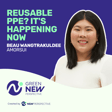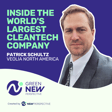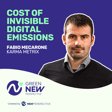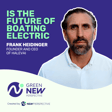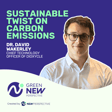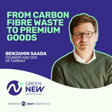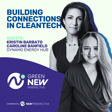
How is Glue Changing Recycling? Podcast With Geisys Ventures
Recycling and sustainability are big challenges today, especially with plastics and materials science. Our recycling systems are flawed, and many people aren't aware of the issues, making environmental problems worse. Dr. Kristoffer Stokes and his team at Geisys Ventures are tackling these problems head-on with innovative solutions for plastics and manufacturing.
Their cutting-edge technology, D-glue, makes it easier to recycle and repair products made from mixed materials. In this episode, we talk about the hurdles in recycling, how Geisys Ventures is addressing them, and the importance of reducing consumption and fixing products. Dr. Stokes also shares success stories and advises anyone wanting to make a positive impact on the environment.
Guest: Dr. Kristoffer Stokes, Principal Scientist at Geisys Ventures
🎧 Subscribe to our podcast:
━━━━━━━━━━━━━
- Spotify: https://bit.ly/3PSWIyI
- Apple Podcasts: https://bit.ly/3RvlHte
- Youtube: https://bit.ly/3RDzkXg
- Deezer: https://bit.ly/3PvQaof
- Amazon Music: https://bit.ly/3PQlijS
- Zencastr: https://bit.ly/48xt75s
💬 Follow GNP podcast on social media:
━━━━━━━━━━━━━
- Instagram: https://www.instagram.com/greennewperspective/
- LinkedIn: https://www.linkedin.com/company/new-perspective-marketing/
- Facebook: https://www.facebook.com/greennewperspective
- TikTok: https://www.tiktok.com/@greennewperspective
🌍 Cleantech podcast created by New Perspective Marketing
━━━━━━━━━━━━━━━━━━━━━━━━━━━
This podcast is proudly sponsored by New Perspective Marketing, a dynamic growth marketing agency in Boston, MA, celebrating 20 years in business. We help sustainably focused B2B organizations grow their brands and scale up revenue. If you or your organization is looking to grow, visit https://www.npws.com for more info.
💚 GNP Team:
━━━━━━
- Host & Co-Producer: Dunja Jovanovic
- Executive Producer: Marko Bodiroza
- Creator: Nathan Harris
- Video Editor & Content: Marija Davidoski
#Sustainability #CleantechPodcast #podcast

